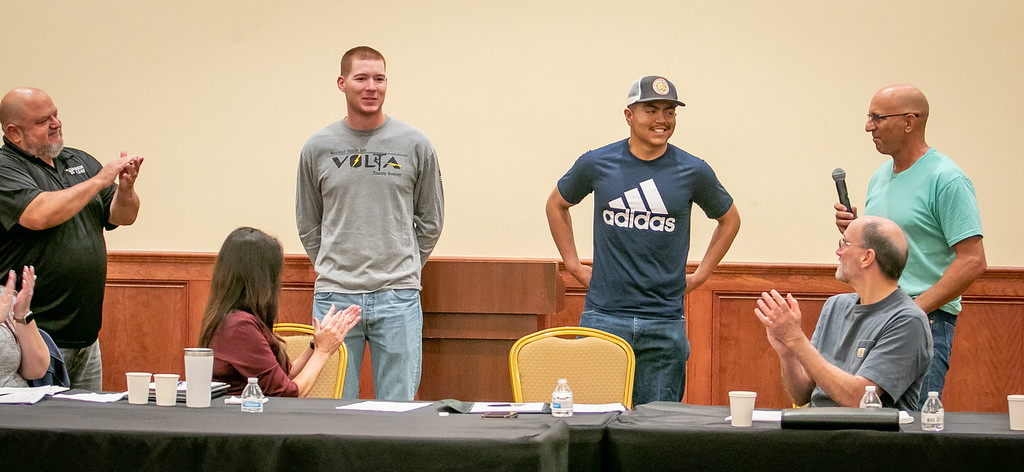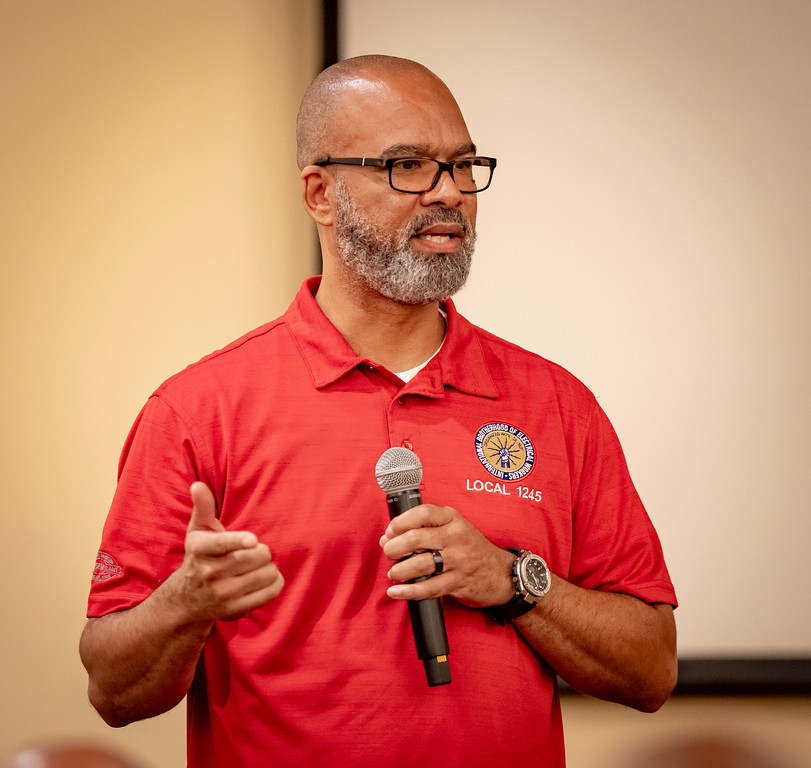At IBEW 1245’s first Advisory Council meeting since the start of the pandemic, workplace safety was front and center on the agenda.
“The utility industry is one of the most dangerous places to work in the United States, and 32 members have fallen in my time at 1245,” IBEW 1245 Business Manager Bob Dean told the Advisory Council, noting the significant uptick in serious injuries and fatalities over recent months. “Right now, we are getting injured at an unprecedented rate, and I’m here to tell you that there is nobody coming to save us. There’s no corporate safety program, no boss, no slogan, no hat or t-shirt that’s going to turn the tide of this. It’s got to be us, standing up as professionals in this industry, and looking out for our brothers and sisters. Take a look in the mirror, because that’s who’s going to save us. There is no other option.”
Senior Assistant Business Manager Ralph Armstrong reflected on a recent meeting he’d had with leaders of IBEW 1245’s peer safety committee members.
“I asked a question: ‘How many people in here have kids?’ Everybody raised their hand. My next question was, ‘How many want their kids working in this industry?’ Nobody. Silence. One person did say that they would, but only if their kid could work with them. Think about that,” he said. “So I laid in bed at night, trying to digest everything that took place, and it came to me. What if we treated everybody that we worked with like they were our own kids working for us? The most precious thing we ever had working for us, imagine if we watched over them that same way. We could probably end all this.”
Armstrong proceeded to introduce Dela Marth, whose son, IBEW Apprentice Brandon Orozco, died on the job in 2013. She spoke candidly about the incapacitating amount of pain she experienced after losing her son, and how her life changed forever on that day.
“They say that life goes on, but it kind of stopped for me. Because he was my son. I’m lost, I don’t know where to go. Sometimes, I feel like my life is over,” she said, her voice filled with emotion. “And now, all my son’s friends are getting married, having kids … and I’m at the weddings, and buying presents for the babies, knowing I will never have a grandchild.”
For Marth, connecting with other line families who have been through similar losses helped her find some solace and purpose. In honor of her son, Marth started an organization called Brother’s Keeper, which aims to raise safety awareness for linemen on the job, and also raises funds for other families who have lost a loved one to the trade. She explained how she felt when she recently met with the mother of Johnny Cabrera, the 24-year-old groundman who died in a mini-excavator accident this spring.
“She was like me, we had no clue what to do. I’m trying to guide her through the process, and it’s so hard,” she said. “But if I can help anyone here, don’t hesitate to call. I’m going to be here for you all the time, I’m not going anywhere because I feel comfortable here. [IBEW] is my family.”
Later, IBEW 1245’s new safety rep, Fred Aboud, made an impassioned presentation about the importance of growing the union’s Safety Steward program. Flanked by representatives from the Control the Pressure Gas Safety Committee, the Keep the Clearance Tree Trimmer Safety Committee, and the Hold the Pull Electric Safety Committee, he explained how the peer-to-peer safety program works to empower members to speak up, stop the job, and have tough conversations when they see something potentially unsafe at work. Other staffers and leaders of the peer committee echoed those sentiments as well.
“Hopefully all of you are going to be joining this group of safety stewards up here, because there has to be membership involved, and it has to be everybody. We need an army,” said Dean. “No matter whether you’re called a safety steward or not, this has got to be on top of everybody’s mind.”
Dean: “We are the Gatekeepers”
In the Business Manager’s report to the Advisory Council, Business Manager Bob Dean gave a comprehensive overview of the state of the union, highlighting the fact that Local 1245 and its members have fared exceptionally well during the course of the pandemic.
“The work picture for IBEW 1245 members is phenomenal. We are thriving. Through this pandemic, with all the things that happened, none of our members got laid off through this, everybody kept working,” he noted, pointing out that between fire hardening, undergrounding, tree trimming, and more, the work outlook should remain strong for generations to come.
He also mentioned several key victories we’ve achieved for our members over the past 18 months, which include a new agreement to improve wages and benefits for vegetation inspectors, the legislation we helped pass to raise up standards and training for tree trimmers, victories at the bargaining table, and the various ways that Local 1245 is staying ahead of the curve in terms of new technologies and a changing industry. As an example, he highlighted a recent victory with the California State Licensing Board around utility-scale battery installation.
“We succeeded in ensuring that no battery could be installed unless it’s done by a certified contractor,” he explained. “Which means, generally speaking, batteries are going to be installed by qualified electrical workers, it’s going to be our work.”
But he also underscored the many threats and challenges we face as the utility industry evolves, and the importance of remaining diligent in protecting the work that has traditionally been performed by IBEW members.
“if there’s an electron or a molecule, and there’s a gas molecule going through it, or electron going through it, that needs to be our work,” Dean said. “So these battles go on, we fight everywhere we can to achieve everything that we have. We give away nothing, but we also need all of this new work – we need EV, we need solar, we need batteries, we need the future to also be ours. That’s how we survive.”
“We are the gatekeepers here,” he continued. “We’ve had generations of 1245 members come before us, and they build what we have. If we do our work, if we do a good job, then more generations will come after us, it will be their time — But only if we do our part. Right now, it’s our time to fight. This is a perpetual, never ending fight. I get asked all the time, when are we going to quit fighting? And the answer is, when we’re dead.”
Ayeta Scholarship Winners Recognized
In 2020, IBEW 1245 established a new line school scholarship program for first-generation utility workers. The Jairus Ayeta Line School scholarship is named in honor of an IBEW 1245 apprentice who was the victim of a fatal workplace tragedy on August 4, 2018 while restoring power at the Carr Fire outside Redding, California.
The first two Ayeta Scholarship awardees, Matt Carrier and Estevan Salazar, were selected in January of this year. They both enrolled in the Northwest IBEW JATC-sanctioned VOLTA Line School in Oregon this spring, with all their expenses paid for by IBEW 1245, and at the July Advisory Council meeting, Senior Assistant Business Manager Bob Gerstle commended them for exceeding the union’s expectations.
“These two graduated at or near the top of the class, and now we’ve got them on as PG&E hiring hall utility workers with GC. Matt is working out at Davis, and Estevan is working out of North Valley,” said Gerstle. “The feedback has been unbelievable. I cannot tell you how proud I am of these two young men, how successful they’re going to be.”
The next two recipients of the Ayeta scholarship will be starting at VOLTA this month. Read about them here.

Business Manager Bob Dean and Senior Assistant Business Manager Bob Gerstle applaud Ayeta Scholarship winners Matt Carrier and Estevan Salazar

Senior Assistant Business Manager Anthony Brown recognized the longtime IBEW 1245 union hall staffers who retired during COVID-19, including Gail Varner, Karen Kiley, Muriel Moore and Peggy Proschold.

Business Manager Bob Dean honored the passing of longtime Business Rep Landis Marttila, who had just retired last year after 30 years on staff at 1245.

The IBEW Local 1245 Advisory Council in Vacaville on July 31st, 2021

The IBEW Local 1245 Advisory Council in Vacaville on July 31st, 2021

Fred Aboud, with microphone, surrounded by safety stewards and members of IBEW 1245’s peer safety committees

The Electrical Workers Minority Caucus announced the winners of their fundraising raffle, which raised $1,369 for the constituency organization. Staffers Keith Hopp and Bryan Carroll won the raffle. Carroll announced he would donate his prize to Dela Marth of Brother’s Keeper.

President Cecelia De La Torre congratulates Ysabel Moreno, winner of IBEW 1245’s Survivor’s Scholarship.